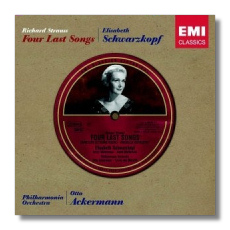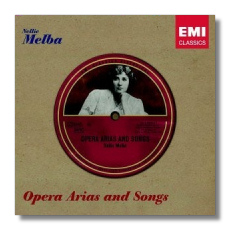
The Internet's Premier Classical Music Source
Related Links
- Latest Reviews
- More Reviews
-
By Composer
-
Collections
DVD & Blu-ray
Books
Concert Reviews
Articles/Interviews
Software
Audio
Search Amazon
Recommended Links
Site News
 CD Review
CD Review
EMI Historical Series

Richard Strauss
- Four Last Songs. Capriccio: Closing Scene
- Arabella: Excerpts *
Elisabeth Schwarzkopf, soprano
Philharmonia Orchestra/Otto Ackermann
* Philharmonia Orchestra/Lovro von Matačić
EMI Classics 585825-2 ADD monaural 77:30


Nellie Melba – Opera Arias And Songs
- Arias and scenes from Lucia di Lammermoor, Rigoletto, La traviata, Roméo et Juliette, Faust, La bohème, and Otello. Songs by Tosti, Bemberg, Bishop, Bach-Gounod, Chausson, and Szulc
Nellie Melba, soprano
Various accompaniments
EMI Classics 585826-2 ADD monaural 68:38
Now history is even easier to own – at least a piece of it – thanks to the recently launched EMI Historical Series. EMI is making a selection of its most famous pre-stereo recordings available at a budget price. To make the series more economically feasible, EMI is omitting sung texts and libretti from these releases, but readers may access these materials over the Internet at www.emiclassics.com. (The mid- or full-priced equivalents of these releases remain available for those who prefer to have these materials at their fingertips.) The discs reviewed here are part of the second wave of five releases. A few words will suffice, because these recordings are very familiar.
This is the first of Schwarzkopf's two studio recordings of Richard Strauss's valedictory Four Last Songs. The 1953 recording catches her voice at its peak, but she is less emotional here (but also less mannered) than she would be on the later (stereo) recording with George Szell. Her voice is silvery, and the very essence of chic femininity. The scene from Capriccio, recorded at the same sessions, is a good teaser for those who wish to explore this elusive opera. The five Arabella excerpts were recorded a year later with von Matačić. Again, Schwarzkopf's singing is cool but gorgeous, with every inflection applied with the precision and forethought of a jeweler. She is joined by soprano Anny Felbermayer, baritones Josef Metternich and Harald Pröglhöpf, tenor Murray Dickie, and bass Walter Berry. The fine digital remastering dates from 2000.
It is shocking to be reminded that some of the selections on the Melba disc are more than a hundred years old. With recordings as old as these, sometimes it is hard to discern what all the shouting was about – I admire Caruso, for example, but have yet to fall in love with him – but the essence of Melbaness, if you will, seems to come through on this compilation. Stylistically, some of what she did was dead wrong, and my choir director would have slapped her regal wrists for the way in which she habitually scooped up to notes, or from one note to another. By the time of her Covent Garden farewell in 1926 – of which several excerpts are included here - her timbre often sounded like that of a brash 12-year-old boy. But there is something magical behind all these faults and perils. Melba's voice, right or wrong, can grab you by the ears and compel you to listen. When she sang, she gave the music 110%. Do you have trouble listening to acoustic-era records? Melba might well give you a reason to make an exception. Anyway, Keith Hardwick's remasterings are remarkably good. Curious about the legend of the Australian songbird who had a peach dessert named for her? This budget-priced CD is an excellent way to hear what you've been missing.
Copyright © 2004, Raymond Tuttle


















